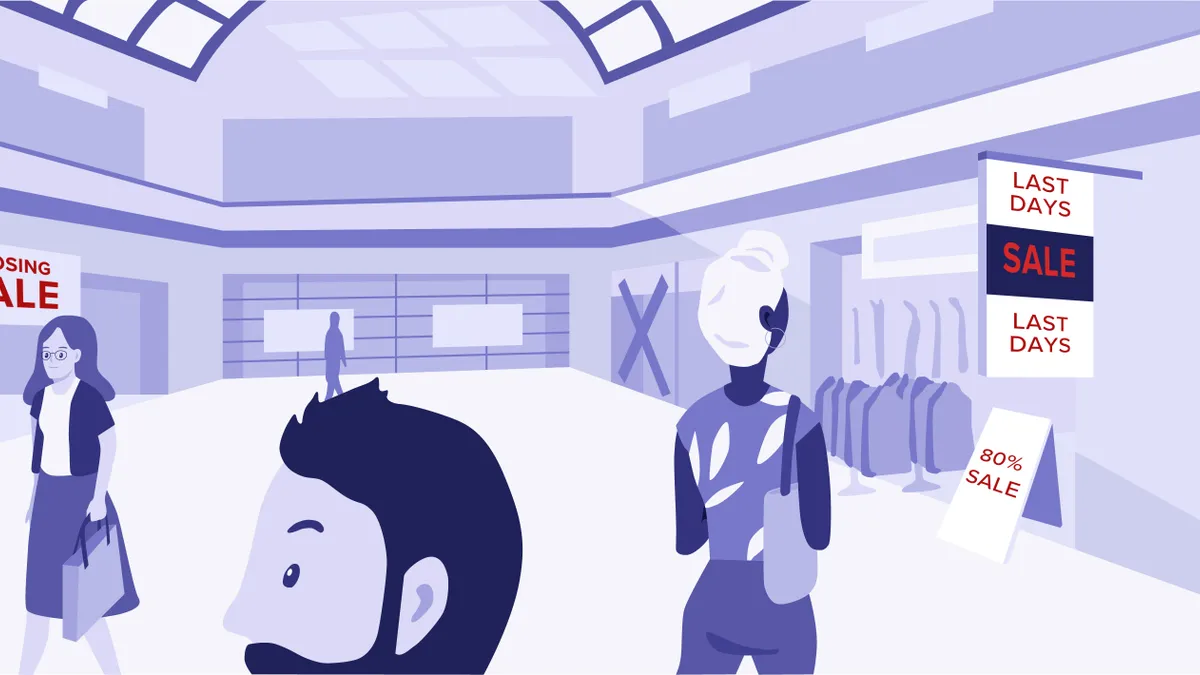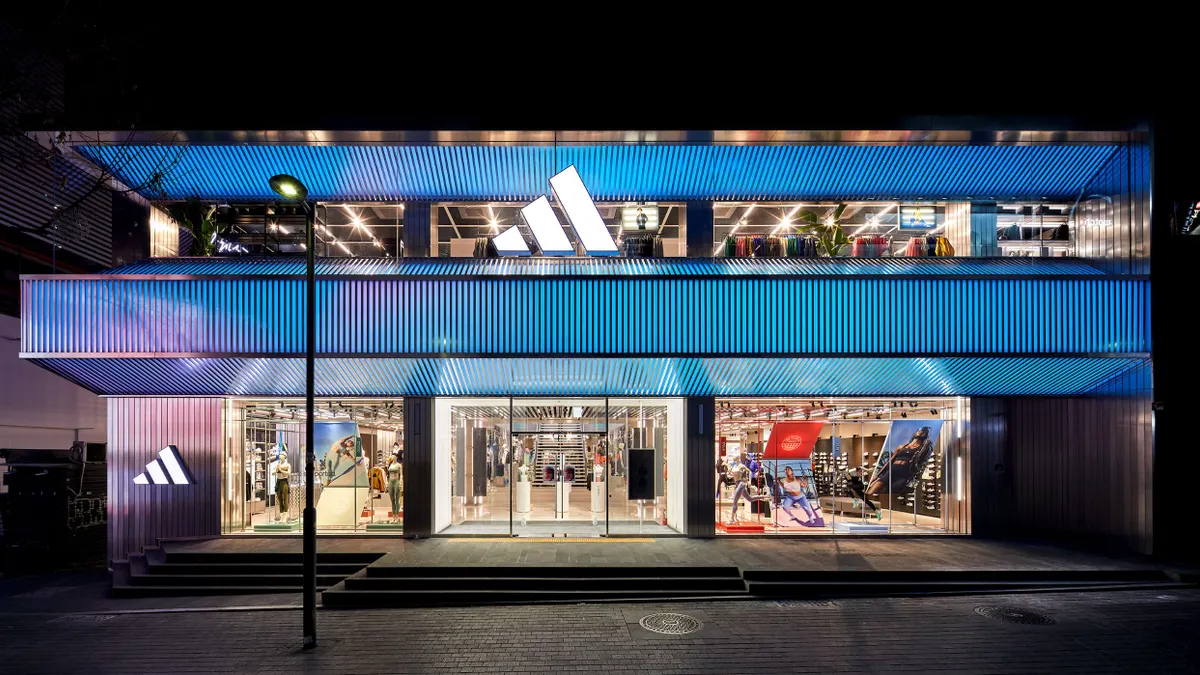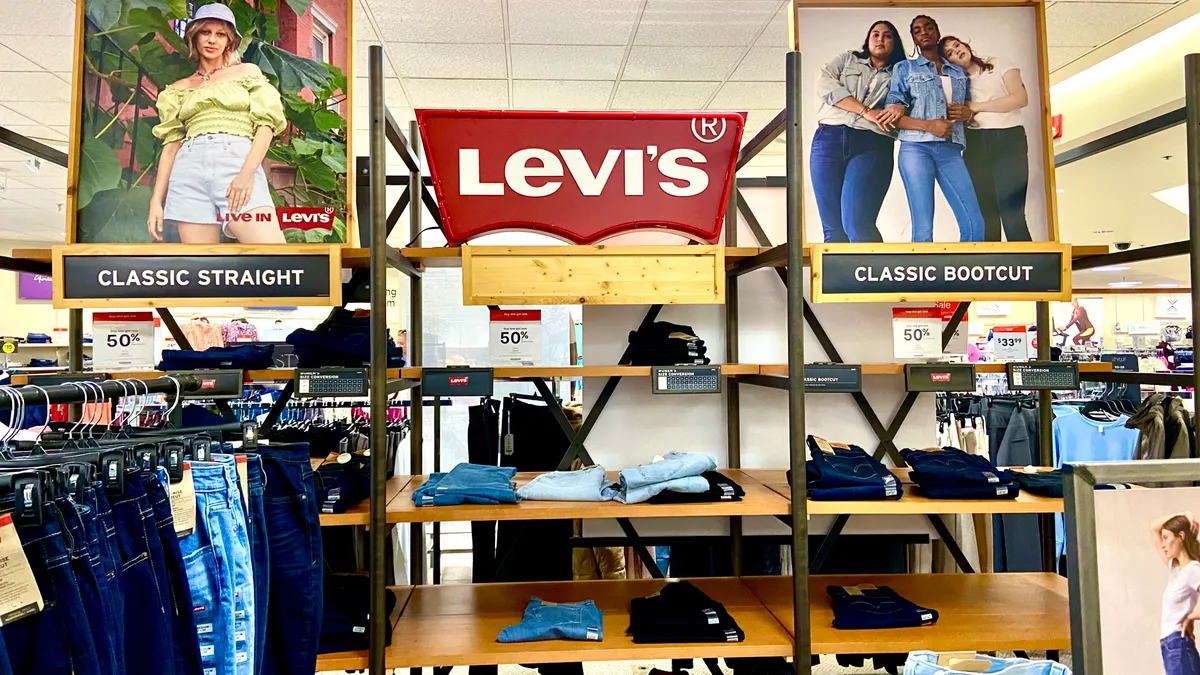Retail bankruptcies may hit a painful high-water mark in 2020. Multiple analysts have noted filings are likely to reach their highest number in a decade. Some weeks during the summer brought multiple filings by major names in the industry.
In a kind of chorus, the cohort of filers have pointed to the tribulations brought by COVID-19 in explaining their predicaments, citing massive revenue drops from store closures, pressure from landlords, and white-hot cash burn.
Many of them, though, entered the year in a vulnerable state and may have filed anyway. Filings have been elevated since 2016, when declines in mall traffic, e-commerce penetration, market share theft by discounters and mass merchants, and a host of other issues began combining to tip into Chapter 11 those retailers with the highest debt levels and worst sales trends.
Some of the biggest names to enter Chapter 11 this year have made numerous appearances on Retail Dive's past bankruptcy watch lists. That includes J. Crew and Neiman Marcus, which, until they filed, appeared on every past watch list Retail Dive has published since it began doing so in the summer of 2017. J.C. Penney, one of the largest bankruptcies this year in terms of company revenue, has appeared on every watch list since 2018.
Companies that appeared on past Retail Dive watch lists that went on to file for bankruptcy
| Retailer | Year filed |
|---|---|
| Ascena | 2020 |
| Bluestem Brands | 2020 |
| GNC | 2020 |
| J. Crew | 2020 |
| J.C. Penney | 2020 |
| Neiman Marcus | 2020 |
| Pier 1 | 2020 |
| RTW Retailwinds | 2020 |
| Stein Mart | 2020 |
| Tailored Brands | 2020 |
| Tuesday Morning | 2020 |
| Charlotte Russe | 2019 |
| Destination Maternity | 2019 |
| Fred’s | 2019 |
| Bon-Ton | 2018 |
| Claire’s Stores | 2018 |
| David’s Bridal | 2018 |
| Nine West | 2018 |
| Sears Holdings | 2018 |
| Charming Charlie | 2017 |
Companies with stressed balance sheets and poor sales trends came into 2020 with little room for error and then got clobbered by a massive, unprecedented event, one that took its toll even on relatively healthy companies.
Nor is the bloodletting over. Bankruptcies have largely slowed as the industry heads into the holiday season. But depending how the holidays shake out, 2021 could bring another wave.
Meanwhile, consumers continue to shift their shopping habits as the pandemic wears on. Foot traffic is still depressed in many sectors, especially mall-based retail. Supply chains have gone through tremendous financial stress along with retail. More consumers have been shopping online than ever. Target and Walmart have seen large sales and market share gains as they lean on the combination of digital platforms and stores. Federal stimulus measures that helped prop up the economy and retail sales in the spring and summer have run out.
17 Retailers with an elevated risk of bankruptcy
Z
A
Z
A
According to data provided by CreditRiskMonitor, 17 companies are at heightened risk of filing for bankruptcy in the next 12 months. As of Sept. 29, eight retail companies had a FRISK score of 1, indicating the highest risk, with an estimated 10% to 50% chance of filing for bankruptcy.
More than half of those have seen their FRISK scores drop to the riskiest level since March, among them Express and Chico's (with the largest drops in FRISK scores) as well as Francesca's, Destination XL and iMedia Brands.
Another nine retailers had FRISK scores of 2, with a 4% to 10% chance of bankruptcy. Those scores are based on credit ratings, stock volatility, financial metrics and proprietary data around the use of CreditRiskMonitor's platform. Among them, Vince, L Brands, Christopher & Banks, Children's Place, Caleres and Designer Brands all saw their scores drop to a 2 since the COVID-19 crisis began. Express, Chico's and Francesca's all dropped from scores of 3 or 4 to 1 in the same period.
| FRISK score | Probability of bankruptcy within 12 months | |
|---|---|---|
| Best | 10 | 0.00% – 0.12% |
| 9 | 0.12% – 0.27% | |
| 8 | 0.27% – 0.34% | |
| 7 | 0.34% – 0.55% | |
| 6 | 0.55% – 0.87% | |
| 5 | 0.87% – 1.40% | |
| 4 | 1.40% – 2.10% | |
| 3 | 2.10% – 4.00% | |
| 2 | 4.00% – 9.99% | |
| Worst | 1 | 9.99% – 50.00% |
Because FRISK scores only cover publicly traded companies, they don't cover the full universe of retail and potential risk. Among private retailers rated by Moody's not listed above, six carry a C-level rating indicating high default risk: Joann, Belk, NMG Holding Company (the reorganized Neiman Marcus), 99 Cents Only, Petco and Guitar Center. There are still other major retailers at risk not captured by that data either.
Here is a look at a few of the retailers that are at risk:
J. Jill
Apparel seller J. Jill has already dodged bankruptcy once this year. In the spring, when the COVID-19 closures hit industry revenue like a meteor, J. Jill joined the retailers issuing "going concern" warnings, accounting language that signals to investors they might not be able to remain solvent. That disclosure represented a breach of J. Jill's loan terms, forcing it into forbearance with lenders.
After numerous forbearance extensions, J. Jill produced a deal that would extend debt maturities and boost its liquidity. Without enough support for the agreement, J. Jill would have had to file for Chapter 11, the company said. Later, in mid-September, it announced that it had enough support among its lending base to complete the out-of-court deal.
The company still has an uphill climb ahead of it. In the second quarter, J. Jill's sales were down nearly 50% year over year. What's more, J. Jill had problems going into the pandemic. In 2019, the retailer posted a comparable sales decline of 3.6% and net loss of $128.6 million.
Party City
Graduations, weddings, birthdays, sports celebrations — cancelled. COVID-19 not only forced Party City to close its stores this spring, it also attacked the very heart of its business: social gatherings.
As with most others with heightened risk scores, Party City's problems started well before the pandemic. Comparable sales in 2019 fell 3% as the retailer racked up a loss of more than half a billion dollars. It is also saddled with some $1.7 billion in debt, a hangover from a previous private equity buyout.
The pandemic has exacerbated all of the retailer's woes. Even as BOPIS sales exploded by 500% in May, the retailer's overall sales were still down by 19%. The company has bought itself some time with a debt deal in June that extended maturities and eased its balance sheet.
But it still has a tough road ahead. Halloween, which accounts for 20% of Party City's retail sales and was a "disaster" for it in 2019, is fragmented this year amid the pandemic. Party City plans to open less than a tenth of the pop-up Halloween City stores that it did last year, though it's boosting staff at individual stores to support omnichannel services.
L Brands
As profits turned negative at L Brands last year, executives unveiled a plan to revive Victoria's Secret. A few months later, the company planned to unload a majority stake in the lingerie giant to private equity firm Sycamore Partners as CEO Lex Wexner announced he would step down.
And then the pandemic upended the deal, which would have brought in cash and freed the company to focus on its successful Bath & Body Works banner. L Brands is once again stuck with a massive brand in decline as competitors ascend and Victoria's Secret's sexualized marketing loses traction. As L Brands tries to manage that decline, it has said it will close 250 Victoria's Secret stores this year.
During the shutdown period, the company, like many others in retail, took on hundreds of millions of dollars in new debt after it drew down its revolver and issued new bonds in an effort to raise cash with stores closed. Since then, though, L Brands has also bought back some of its outstanding bonds due to mature in the coming years to take some debt off its balance sheet.
Francesca's
In June, women's apparel retailer Francesca's disclosed to investors that it might have to file for bankruptcy if it runs into financing constraints. That followed a "going concern" disclosure that warned about its ability to survive as a business.
Survival is tough for apparel retailers right now. Mall traffic remains well below last year's levels, which were already then — in a growing economy — troubled. Francesca's, with a relatively large store portfolio, has struggled in that environment. Last year, the company moved to close stores and its chairman departed as its stock price plummeted on continued sales declines and profit losses.
COVID-19 only made things harder. In the second quarter, even after most stores reopened, sales were down by nearly 30% and the company was still generating profit losses from its operations. Executives said that they are exploring strategic alternatives, which could include debt restructuring.
Chico's
Like Francesca's, Chico's has struggled in the world of mall-based apparel. Sales have been on a steady decline since 2015, and profits turned negative last year. In 2019, the retailer announced it would close 250 stores in an effort to refocus around omnichannel.
This year has brought even deeper difficulties. By Q2, sales had improved from the period before, which included the pandemic closures, but still remained down nearly 40% from the year before.
The retailer has named a new CEO and moved to slash costs as it tries to navigate the COVID-19 era. In August, the retailer's Canadian arm filed for bankruptcy after its stores in the country never reopened.
Some analysts, though, see hope for the retailer, which also runs the White House Black Market, Soma and TellTale brands. "We anticipate performance to start to meaningfully improve as consumers start returning to stores or moving to online purchases due to pent-up demand," B. Riley FBR analyst Susan Anderson said after Q2 in an emailed note. "We also believe the shift to more comfortable and versatile assortment will help entice the CHS consumer to spend."






















